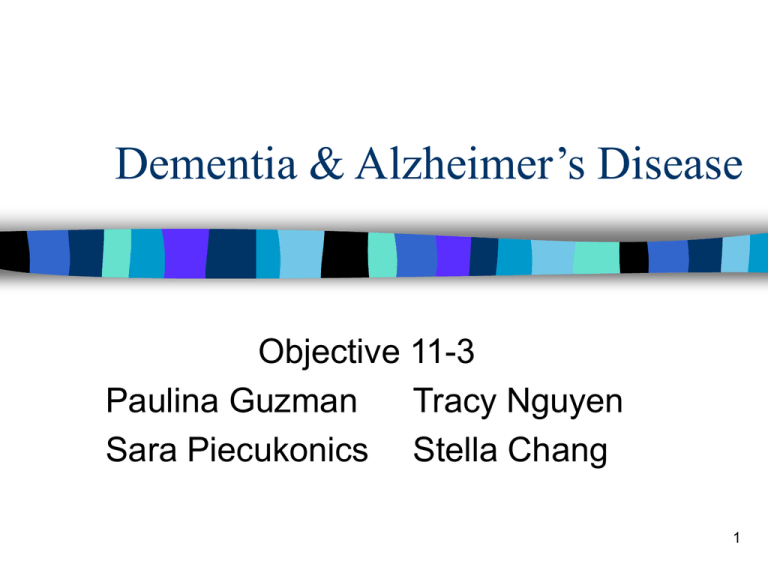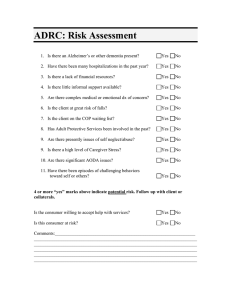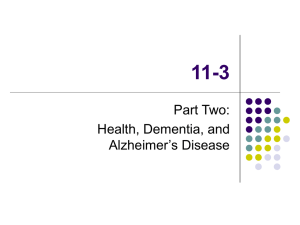Dementia & Alzheimer’s Disease Objective 11-3 Paulina Guzman Tracy Nguyen
advertisement

Dementia & Alzheimer’s Disease Objective 11-3 Paulina Guzman Tracy Nguyen Sara Piecukonics Stella Chang 1 Dementia: What is it? Cause: the extreme loss of brain cells Symptoms: difficulty in learning, communicating, and remembering – Sometimes, an individual may not be aware of the symptoms because of mood and personality changes. Stages of Dementia: 3 Stages: – Individual has problems with minor memory relapse but is able to cover the gaps. – Short term memory is extremely impaired and obvious. The individual may become messier. – There is severe impairment to the brain and the individual may not be able to understand what is being said to them or communicate back. Types of Dementia Cortical Dementia •Problems with memory, language, thinking, and social behavior. Subcortical Dementia •Changes in movement, emotions, and memory Progressive Dementia •Problems with cognitive abilities Primary Dementia •Doesn’t result from other disease Secondary Dementia •Caused by other physical disease Alzheimer’s Disease What is Alzheimer’s? – A disease that usually associates with people that are older. – Symptoms include inability to retain new memory, a gradual relapse on memory, reasoning, language, and physical functioning. – It strikes 3% of the world’s population by the age of 75 Causes: – Series of small strokes, a brain tumor, or alcohol uses can damage the brain little by little. – The primary symptoms of Alzheimer’s is a the loss of brain cells and the declining of neurons that produce Ach (acetylcholine). Since Ach’s function is to enable muscle action, learning, and memory, without this vital chemical messenger, your memory and thinking suffer. Video on Dementia http://vodpod.com/watch/2638977-going- home-a-short-film-on-dementia Health For people growing older, there are both bad news and good news: – Bad News: The body’s disease-fighting immune system weakens, making the elderly more susceptible to life-threatening ailments such as cancer and pneumonia. – Good News: Older people less often suffer shortterm ailments, such as common flu and cold viruses, thanks partly to a lifetime’s accumulation of antibodies. 7 Health (Cont) Aging levies a tax on the brain by slowing our neural processing causing older people to take a bit more time to react, to solve perceptual puzzles, and even remember names. Aging may proceed more slowly in women than men. – Women worldwide live four years longer. – Women’s brains shrink more slowly than men’s Physical exercise enhances muscles, bones, and energy. It helps prevent obesity and heart disease, and feeds the brain, which stimulates brain cell development and connections. This may explain why active older adults tend to be mentally quick older adults. - Study: Sedentary older adults randomly assigned to aerobic exercise programs have exhibited enhanced memory and sharpened judgment. “Use it or lose it” 8




